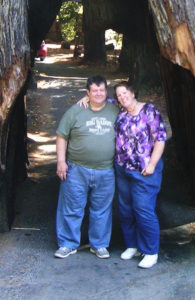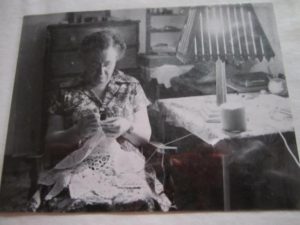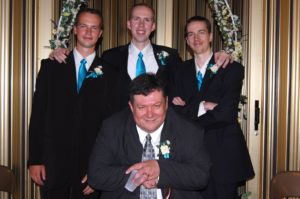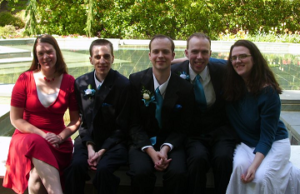New and EverlastingMy Family JourneyBy
| Ad |
 I grew up in The Church of Jesus Christ of Latter-day Saints (LDS) and knew that genealogy was an important thing. When I was very little, I didn’t know why, but my mother was into it, my aunts were into it, and my grandmother was really into it. She lived in a trailer behind my aunt Jaquita’s house. We often visited there and I always spent a little time with Granny.
I grew up in The Church of Jesus Christ of Latter-day Saints (LDS) and knew that genealogy was an important thing. When I was very little, I didn’t know why, but my mother was into it, my aunts were into it, and my grandmother was really into it. She lived in a trailer behind my aunt Jaquita’s house. We often visited there and I always spent a little time with Granny.
By the time I started to get to know her, the ravages of health problems, including diabetes, had already made her seem older to me than anyone else I knew. There was a woman in my congregation back in California who was almost 100 and Granny looked older than she did. She always wanted a kiss on the cheek and I reluctantly complied.
New
There came a time when I was sent to her trailer once and she sat me down with a small table. She handed me a large book and a stack of large papers. The book was her Book of Remembrance and the papers were blank family group sheets.
For those of you not acquainted with these things, a Book of Remembrance is kind of a scrapbook that contains photos, journals, pedigree charts, and these family group sheets. A family group sheet is a form that shows statistics about a family unit. Connect a bunch of them together and you’ve got a picture of your ancestry going back as far as the research has taken you.
She also gave me a pencil and it was my job to copy down, by hand, my pedigree chart and its corresponding family group sheets. It was more than just writing that I was doing. My grandmother told me everything she knew about the people whose names and vitals I was copying down.
She also told me all about the meanings of the boxes on the forms, which all had to do with LDS temple ordinances. In addition to proxy baptisms for the dead, families were “sealed” together as husbands/wives and children/parents. We talked about the Mormon concept of eternal marriage and I gained a conviction that it was a true concept.
I felt somewhat like Joseph Smith when he wrote, “Never did any passage of scripture come with more power to the heart of man than this did at this time to mine. It seemed to enter with great force into every feeling of my heart (Joseph Smith – History, verse 12).”
He wrote about his discovery of James 1:5. For me, what came to me powerfully was that the idea that faithful couples could be married not for just “until death do [they] part”, but for “time and all eternity.” A new thing had happened to me. I had received knowledge that I believed came from God.
Not only did I believe it, I wanted it. There was some doubt in my mind about whether I could achieve it for myself. I knew already that I was attracted to men and I was already figuring out that the name I’d been called since I was little might actually apply to me. The name was “homo” and I knew what it meant. It meant me.
Though I would verbally deny it to anyone who called me the name, I knew it was a good representation of the feelings I regularly felt. It also represented some of the relationships I had. There was no denying that looking ahead to a day when I would be “sealed” to a wife and have children “born in the covenant” was not a very believable future for me.
I had the desire to get married and have that family, but the prospect of reforming my feelings for men and qualifying for marriage to a woman seemed to me to be unreachable. I really didn’t think of my same-sex attraction as a permanent and innate thing, but I didn’t really believe I’d be able to manage it long enough to get married.
“Want” has always been a funny word to me, because it is never absolute. It’s possible to want two very different things at the same time. I wanted to get married and have a family, but I also wanted the life I had been living. I’m certain that the desire to get married was stronger after I came to understand about eternal marriage.
There was an even greater challenge in my mind than my attraction to men. I lived in a blended and highly dysfunctional family. I had no real role models even for marriage that lasted “until death do us part.” My mother was on her second marriage. My father was absent. There was divorce and abandonment on every level of my family tree.
Of the extended family I knew, only one couple had been married just once and I had been a victim of the sexual abuse at the hands of the husband. As much as I admired and aspired to the idea of permanent, lasting, and eternal marriage, I didn’t see much hope in it for me.
I wasn’t attending church, yet I probably knew the Mormon scriptures better than any active member of the Church my age. I read the entire Bible, Book of Mormon, Doctrine and Covenants, and Pearl of Great Price without ever setting foot in a Sunday meeting for three years.
Some time after I had the experience in Granny’s trailer, I read this:
In the celestial glory there are three heavens or degrees;
And in order to obtain the highest, a man must enter into this order of the priesthood [meaning the new and everlasting covenant of marriage];
And if he does not, he cannot obtain it.
He may enter into the other, but that is the end of his kingdom; he cannot have an increase (Doctrine and Covenants 131:1–4).
This and many other experiences moved me ever more in the direction of returning to church and making a new direction for myself, including the hope of finding the right woman to marry and raise a family with. When I 16, I went back to church. When I was 21, I married the right woman.
There were many reasons I knew Barbara was the right woman, not the least of which was the powerful answer to prayer. It was confirmed for me the moment my Granny first laid eyes on my wife. She started to cry and said, “I’m so glad you didn’t marry a lemon!”
Without really even knowing a thing about Barbara, Granny knew I’d found the woman to put on my family group sheet and mark as sealed in the temple.
Everlasting
With a name of a husband and a wife on my family group sheet, next came the task of filling in the blanks for children. It took a few years, but we could write in five of them and every one of them was a joy.
It is one thing to get married and even call the marriage an eternal one. It is quite another to stay married.
I think it’s a lot easier to think of oneself as married for all eternity than to make it through all of the challenges that life inflicts on a couple. If you’re married and you’ve been married a long time, you’ll know what I mean.
You might even think that with both of us attracted to men, staying married would be nearly impossible. I can honestly say that that particular challenge was really nothing compared to things like struggling with finances, learning to live with someone who isn’t you, illnesses, having different goals, and clashes of personality.
I’ve never really understood couples who say they’ve been married and never had an argument. The only way I can make sense of that is that one of them probably never speaks up for himself or herself. Barbara and I are just not built for that. Both of us have said that we didn’t want to be married to a “yes dear.”
For us, arguing is how we settle on how to do things. Sometimes, we just agree that we’re going to do things differently. The key is to not hold onto resentment for the different ways we do things and certainly to not take our differences too seriously.
I think it is true to say that we’re married for time and all eternity, but it is lived one day at a time. Add up the days, and in a couple of months we’ll reach 39 years together. It’s an increasingly rare thing to run across people who have lasted as long as we have.
A friend of mine recently told me that he was thinking of leaving his wife. He was going to move away from his family. He was going where he wanted to. When I asked him about leaving his family behind, he said, “This is MY time.”
I’ve got to say that I was floored at this idea. He’s not the only man I’ve known who considered living close to family as a low priority. That same day, another man told me how he was glad he didn’t live near his family anymore. He felt free to live his life away from them.
An older gentleman I’m acquainted with didn’t want to go live near his adult daughter in another state. He is starting to need taking care of, but he doesn’t want to be near his grandchildren.
For me, it is torment to live on the other side of the country from three of my eight grandchildren. I want my children and family nearby where I can find joy in being with them. I can’t imagine a time when I would wish to be alone, away from the people that matter most to me. You can’t predict where life and necessity will take you, but the seed of desire (Alma 32:27) that was planted in Granny’s trailer decades ago is now in me a “tree springing up unto everlasting life (Alma 32:41).”
Our children sing a song, which has been in my head for a few days now. One line says, “I always want to be with my own family, and the Lord has shown me how I can (“Families Can Be Together Forever”, Hymns of The Church of Jesus Christ of Latter-day Saints, number 300).”
I can’t ever be sure of where life might drag me. For me, there are few things more certain than that I always, always, always want to be with my own family.







